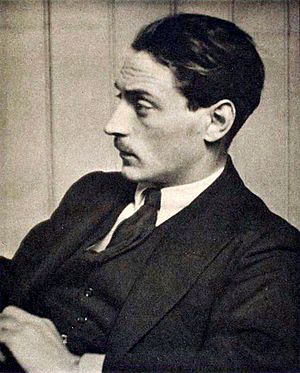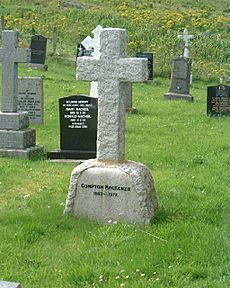Compton Mackenzie facts for kids
Quick facts for kids
Compton Mackenzie
|
|
|---|---|
 |
|
| Born | 17 January 1883 West Hartlepool, County Durham, England
|
| Died | 30 November 1972 (aged 89) Edinburgh, Midlothian, Scotland
|
| Resting place | Barra, Scotland |
| Education | St Paul's School, London |
| Alma mater | Magdalen College, Oxford |
| Occupation |
|
| Years active | 1907–1971 |
|
Notable work
|
Whisky Galore The Monarch of the Glen |
| Spouse(s) |
Faith Stone
(m. 1905; died 1960)Christine McSween
(m. 1962; died 1963)Lilian McSween
(m. 1965) |
| Parent(s) |
|
| Relatives | Fay Compton (sister) Francis Compton (brother) Viola Compton (sister) Henry Compton (grandfather) |
Sir Edward Montague Compton Mackenzie (born January 17, 1883 – died November 30, 1972) was a famous Scottish writer. He wrote many different kinds of books, including stories, biographies (life stories), and history books. He was also a cultural expert and a great storyteller. Compton Mackenzie was a strong supporter of Scottish independence throughout his life. In 1928, he helped start the National Party of Scotland. He was given the title of Sir in 1952.
Contents
Early Life and Education
Compton Mackenzie was born in West Hartlepool, England. He came from a family of actors. His grandfather, Henry Compton, was a well-known actor who performed plays by William Shakespeare. His parents, Edward Compton Mackenzie and Virginia Frances Bateman, also worked in theatre. His sister, Fay Compton, was a famous actress who appeared in many plays, including Peter Pan.
Compton Mackenzie went to St Paul's School, London and then to Magdalen College, Oxford. He studied Modern History at Oxford University.
His Books and Writing
Compton Mackenzie is most famous for two funny novels set in Scotland. These are Whisky Galore (1947) and The Monarch of the Glen (1941). Whisky Galore is set in the Hebrides islands, and The Monarch of the Glen is set in the Scottish Highlands. Both of these books were made into popular movies or TV shows.
He wrote nearly a hundred books on many different topics. These included ten books about his own life, called My Life and Times. He also wrote history books, like those about the Battle of Marathon and the Battle of Salamis. He wrote biographies, stories for children, and poetry. One of his novels, The Four Winds of Love, is often seen as one of his most important works. Other famous writers, like F. Scott Fitzgerald, admired his writing.
His long novel Sinister Street (1913–14) was very important to other writers like George Orwell. Many people praised his writing for being lively and showing real emotions. After he became a Roman Catholic in 1914, he wrote a series of three novels that explored religious themes.
In 1923, Compton Mackenzie helped start Gramophone magazine. This magazine is still very important for people who love classical music. He was the editor of the magazine until 1961. He also worked as a literary critic for the Daily Mail newspaper.
War Experiences and Greek Memories
During the First World War, Compton Mackenzie worked for British Intelligence in the Eastern Mediterranean. He later wrote four books about his experiences. He was a captain in the Royal Marines. Because he wasn't well enough for front-line fighting, he worked on counter-intelligence during the Gallipoli campaign. In 1916, he set up a large intelligence network in Athens, Greece.
In 1917, he started the Aegean Intelligence Service. He was in charge of it for several months. He was even offered the chance to be the President of the Republic of Cerigo, an island that was briefly independent. He received several honors for his service, including the Order of the British Empire (OBE), the French Legion of Honour, and the Greek Order of the Redeemer.
After he published his book Greek Memories in 1932, there were some issues because it quoted from documents that were considered secret. This caused some problems for him, but a new version of the book was eventually published in 1939.
Life on Capri
Between 1913 and 1920, Compton Mackenzie lived with his first wife, Faith, on the Italian island of Capri. He visited the island many times later in his life. Capri was known as a place where artists and foreigners were welcome. He became friends with the writer Somerset Maugham there.
Compton Mackenzie's time on Capri inspired him to write novels about the local people and the foreign residents. These books included Vestal Fire (1927) and Extraordinary Women (1928). He was also friends with Axel Munthe, who built the famous Villa San Michele on the island.
Scottish Connections
Compton Mackenzie felt a very strong connection to Scotland, especially the Highlands and Gaelic culture. Even though he wasn't born in Scotland, he deeply loved the country. He was a strong supporter of the Jacobite cause and helped found the National Party of Scotland.
He was also the rector of the University of Glasgow from 1931 to 1934. He built a house on Barra, one of the Western Isles of Scotland, in the 1930s. Living on Barra helped him find peace and inspiration for his writing. He made many friends there.
Personal Life
Compton Mackenzie was married three times. His first marriage was to Faith Stone in 1905, and they were married for over 50 years until her death. In 1962, he married Christina MacSween, who passed away the next year. In 1965, he married Lilian MacSween.
He was a big fan of the football team West Bromwich Albion F.C.. He also loved snooker and even presented the World Championship trophy to Joe Davis in 1939.
Compton Mackenzie passed away on November 30, 1972, at the age of 89, in Edinburgh. He was buried in the churchyard cemetery at Eoligarry on the Isle of Barra, Scotland.
Biographies
- Linklater, Andro Compton Mackenzie: A Life The Hogarth Press (1992, London)
- Mackenzie, Lady Faith Compton More than I should, Collins (1940)
Filmography
| Year | Title | Role | Notes |
|---|---|---|---|
| 1949 | Whisky Galore! | Captain Buncher | Film debut |
| 1950 | Chance of a Lifetime | Sir Robert Dysart | Final film |
| 1966 | Jackanory | Storyteller |
See also
In Spanish: Compton Mackenzie para niños
 | Anna J. Cooper |
 | Mary McLeod Bethune |
 | Lillie Mae Bradford |


